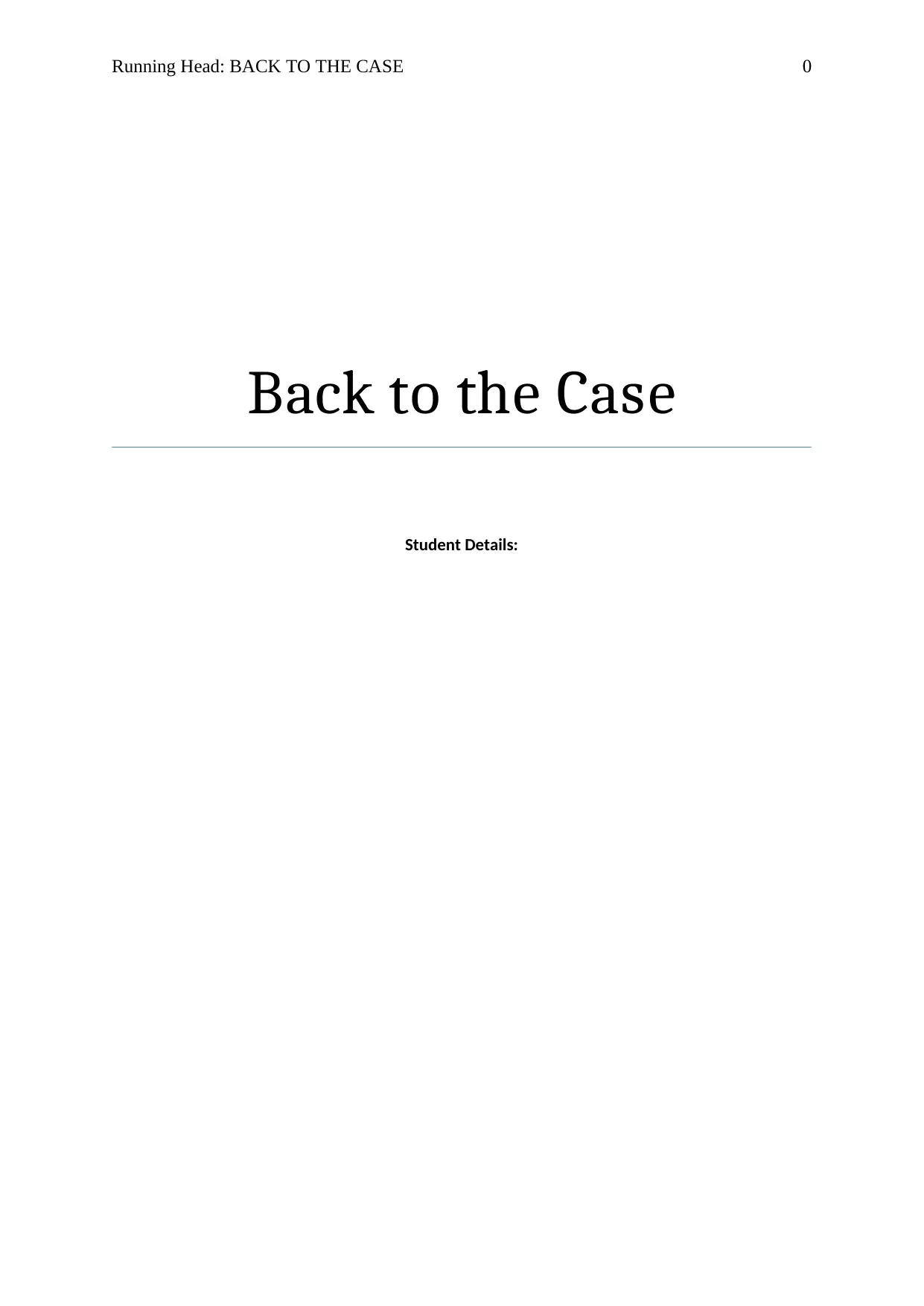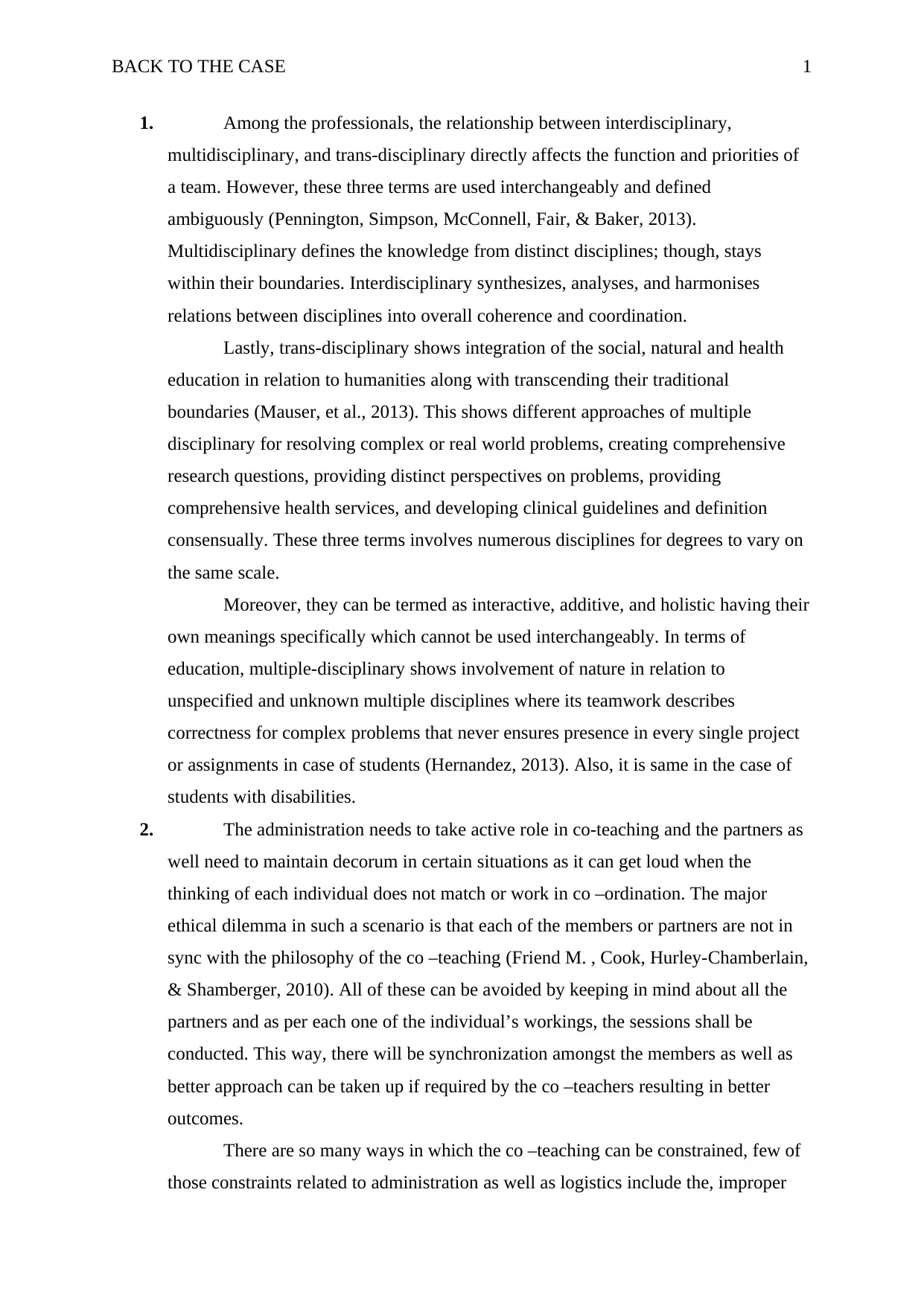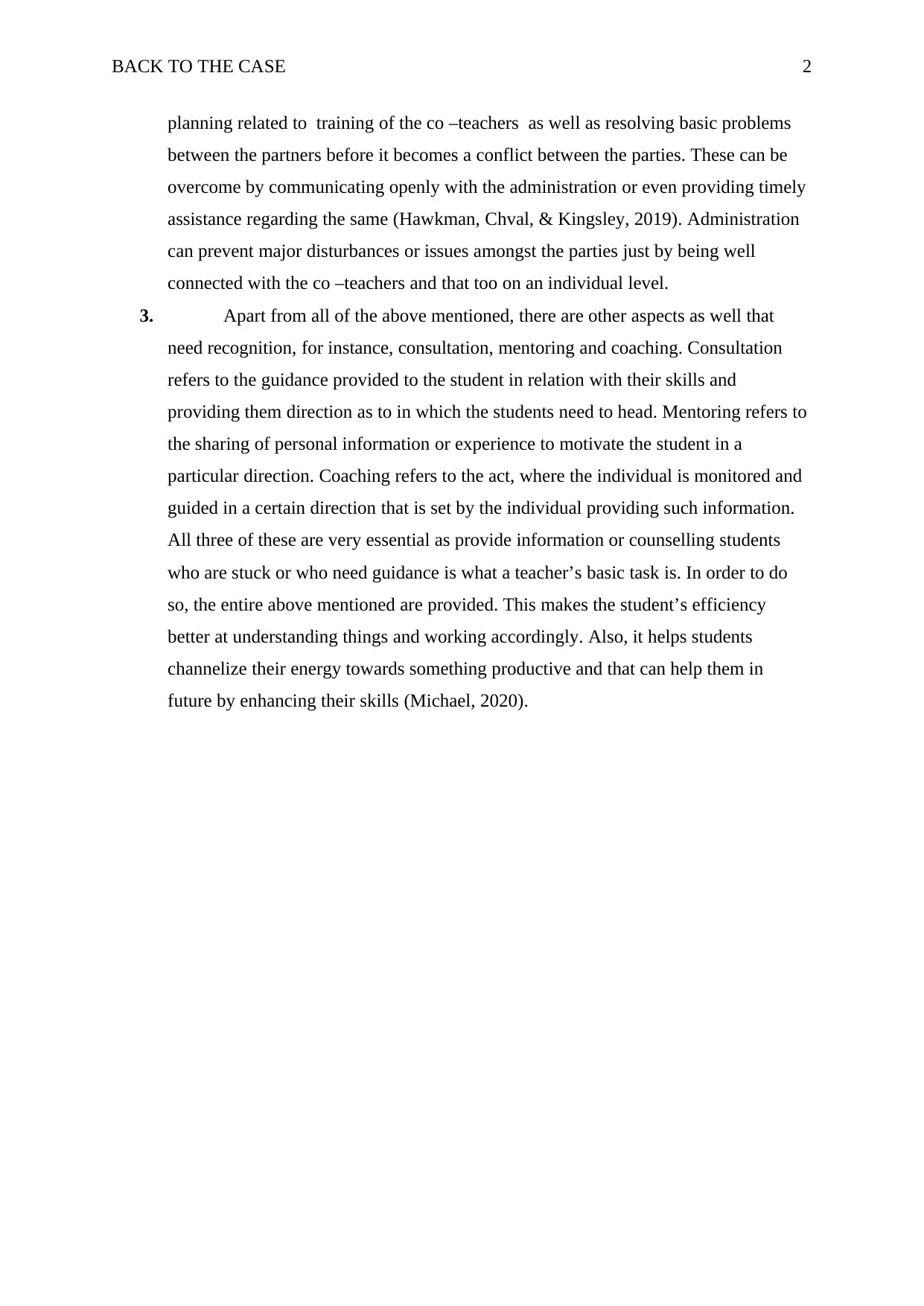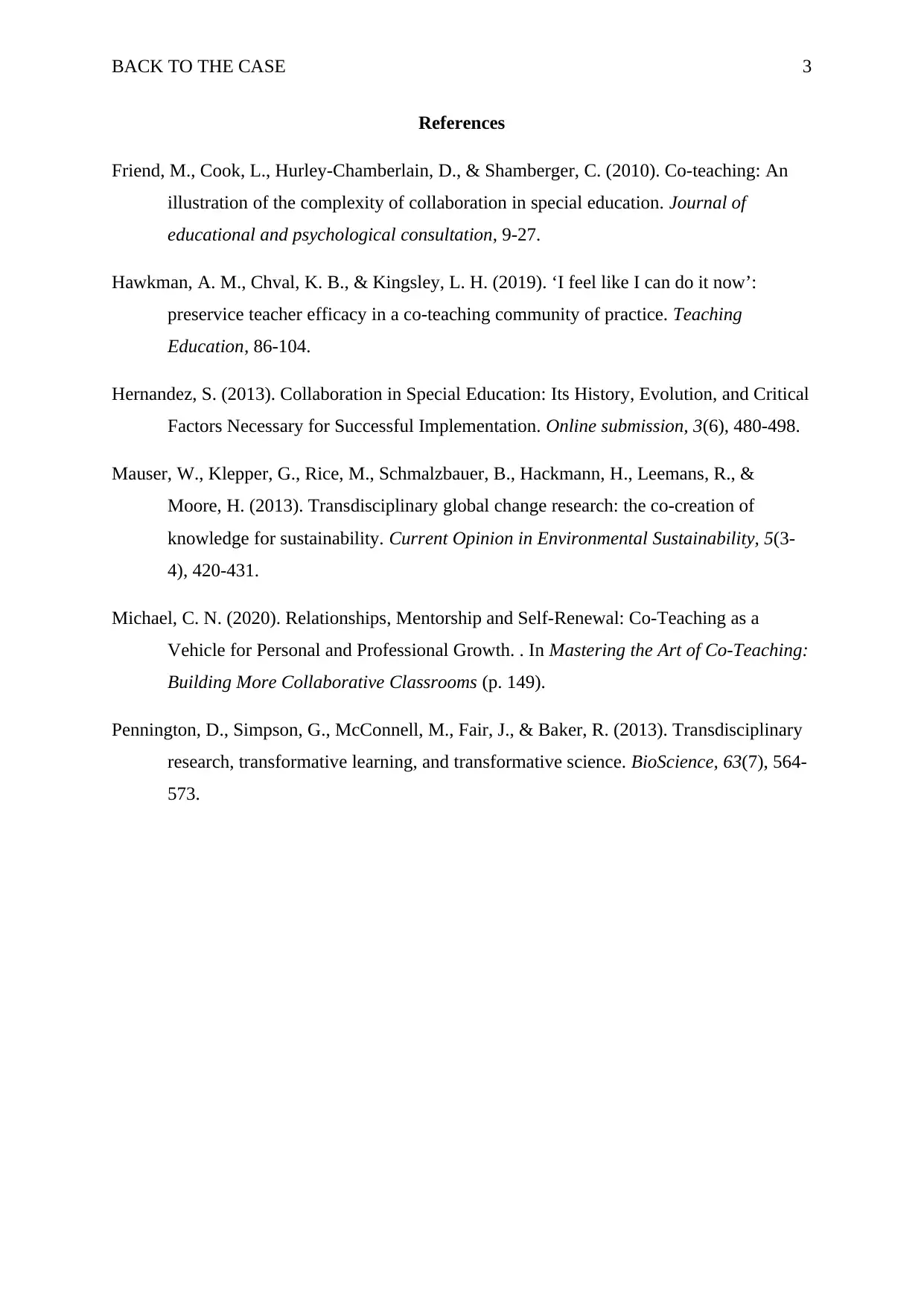Team Analysis and Teacher Interview: Back to the Case Assignment
VerifiedAdded on 2022/09/18
|4
|976
|27
Homework Assignment
AI Summary
This assignment analyzes a case study on team characteristics, focusing on interdisciplinary, multidisciplinary, and transdisciplinary approaches. It explores how these concepts impact team function and priorities, emphasizing the roles of team members and the importance of shared norms and interdependence. The assignment includes an interview with a teacher to gain insights into team dynamics and collaboration within an educational setting. The student explores the ethical dilemmas in co-teaching scenarios, discussing the impact of administration, logistics, consultation, mentoring, and coaching on student outcomes. The analysis provides a comprehensive understanding of teamwork, co-teaching, and the factors that contribute to successful team functioning.

Running Head: BACK TO THE CASE 0
Back to the Case
Student Details:
Back to the Case
Student Details:
Paraphrase This Document
Need a fresh take? Get an instant paraphrase of this document with our AI Paraphraser

BACK TO THE CASE 1
1. Among the professionals, the relationship between interdisciplinary,
multidisciplinary, and trans-disciplinary directly affects the function and priorities of
a team. However, these three terms are used interchangeably and defined
ambiguously (Pennington, Simpson, McConnell, Fair, & Baker, 2013).
Multidisciplinary defines the knowledge from distinct disciplines; though, stays
within their boundaries. Interdisciplinary synthesizes, analyses, and harmonises
relations between disciplines into overall coherence and coordination.
Lastly, trans-disciplinary shows integration of the social, natural and health
education in relation to humanities along with transcending their traditional
boundaries (Mauser, et al., 2013). This shows different approaches of multiple
disciplinary for resolving complex or real world problems, creating comprehensive
research questions, providing distinct perspectives on problems, providing
comprehensive health services, and developing clinical guidelines and definition
consensually. These three terms involves numerous disciplines for degrees to vary on
the same scale.
Moreover, they can be termed as interactive, additive, and holistic having their
own meanings specifically which cannot be used interchangeably. In terms of
education, multiple-disciplinary shows involvement of nature in relation to
unspecified and unknown multiple disciplines where its teamwork describes
correctness for complex problems that never ensures presence in every single project
or assignments in case of students (Hernandez, 2013). Also, it is same in the case of
students with disabilities.
2. The administration needs to take active role in co-teaching and the partners as
well need to maintain decorum in certain situations as it can get loud when the
thinking of each individual does not match or work in co –ordination. The major
ethical dilemma in such a scenario is that each of the members or partners are not in
sync with the philosophy of the co –teaching (Friend M. , Cook, Hurley-Chamberlain,
& Shamberger, 2010). All of these can be avoided by keeping in mind about all the
partners and as per each one of the individual’s workings, the sessions shall be
conducted. This way, there will be synchronization amongst the members as well as
better approach can be taken up if required by the co –teachers resulting in better
outcomes.
There are so many ways in which the co –teaching can be constrained, few of
those constraints related to administration as well as logistics include the, improper
1. Among the professionals, the relationship between interdisciplinary,
multidisciplinary, and trans-disciplinary directly affects the function and priorities of
a team. However, these three terms are used interchangeably and defined
ambiguously (Pennington, Simpson, McConnell, Fair, & Baker, 2013).
Multidisciplinary defines the knowledge from distinct disciplines; though, stays
within their boundaries. Interdisciplinary synthesizes, analyses, and harmonises
relations between disciplines into overall coherence and coordination.
Lastly, trans-disciplinary shows integration of the social, natural and health
education in relation to humanities along with transcending their traditional
boundaries (Mauser, et al., 2013). This shows different approaches of multiple
disciplinary for resolving complex or real world problems, creating comprehensive
research questions, providing distinct perspectives on problems, providing
comprehensive health services, and developing clinical guidelines and definition
consensually. These three terms involves numerous disciplines for degrees to vary on
the same scale.
Moreover, they can be termed as interactive, additive, and holistic having their
own meanings specifically which cannot be used interchangeably. In terms of
education, multiple-disciplinary shows involvement of nature in relation to
unspecified and unknown multiple disciplines where its teamwork describes
correctness for complex problems that never ensures presence in every single project
or assignments in case of students (Hernandez, 2013). Also, it is same in the case of
students with disabilities.
2. The administration needs to take active role in co-teaching and the partners as
well need to maintain decorum in certain situations as it can get loud when the
thinking of each individual does not match or work in co –ordination. The major
ethical dilemma in such a scenario is that each of the members or partners are not in
sync with the philosophy of the co –teaching (Friend M. , Cook, Hurley-Chamberlain,
& Shamberger, 2010). All of these can be avoided by keeping in mind about all the
partners and as per each one of the individual’s workings, the sessions shall be
conducted. This way, there will be synchronization amongst the members as well as
better approach can be taken up if required by the co –teachers resulting in better
outcomes.
There are so many ways in which the co –teaching can be constrained, few of
those constraints related to administration as well as logistics include the, improper

BACK TO THE CASE 2
planning related to training of the co –teachers as well as resolving basic problems
between the partners before it becomes a conflict between the parties. These can be
overcome by communicating openly with the administration or even providing timely
assistance regarding the same (Hawkman, Chval, & Kingsley, 2019). Administration
can prevent major disturbances or issues amongst the parties just by being well
connected with the co –teachers and that too on an individual level.
3. Apart from all of the above mentioned, there are other aspects as well that
need recognition, for instance, consultation, mentoring and coaching. Consultation
refers to the guidance provided to the student in relation with their skills and
providing them direction as to in which the students need to head. Mentoring refers to
the sharing of personal information or experience to motivate the student in a
particular direction. Coaching refers to the act, where the individual is monitored and
guided in a certain direction that is set by the individual providing such information.
All three of these are very essential as provide information or counselling students
who are stuck or who need guidance is what a teacher’s basic task is. In order to do
so, the entire above mentioned are provided. This makes the student’s efficiency
better at understanding things and working accordingly. Also, it helps students
channelize their energy towards something productive and that can help them in
future by enhancing their skills (Michael, 2020).
planning related to training of the co –teachers as well as resolving basic problems
between the partners before it becomes a conflict between the parties. These can be
overcome by communicating openly with the administration or even providing timely
assistance regarding the same (Hawkman, Chval, & Kingsley, 2019). Administration
can prevent major disturbances or issues amongst the parties just by being well
connected with the co –teachers and that too on an individual level.
3. Apart from all of the above mentioned, there are other aspects as well that
need recognition, for instance, consultation, mentoring and coaching. Consultation
refers to the guidance provided to the student in relation with their skills and
providing them direction as to in which the students need to head. Mentoring refers to
the sharing of personal information or experience to motivate the student in a
particular direction. Coaching refers to the act, where the individual is monitored and
guided in a certain direction that is set by the individual providing such information.
All three of these are very essential as provide information or counselling students
who are stuck or who need guidance is what a teacher’s basic task is. In order to do
so, the entire above mentioned are provided. This makes the student’s efficiency
better at understanding things and working accordingly. Also, it helps students
channelize their energy towards something productive and that can help them in
future by enhancing their skills (Michael, 2020).
⊘ This is a preview!⊘
Do you want full access?
Subscribe today to unlock all pages.

Trusted by 1+ million students worldwide

BACK TO THE CASE 3
References
Friend, M., Cook, L., Hurley-Chamberlain, D., & Shamberger, C. (2010). Co-teaching: An
illustration of the complexity of collaboration in special education. Journal of
educational and psychological consultation, 9-27.
Hawkman, A. M., Chval, K. B., & Kingsley, L. H. (2019). ‘I feel like I can do it now’:
preservice teacher efficacy in a co-teaching community of practice. Teaching
Education, 86-104.
Hernandez, S. (2013). Collaboration in Special Education: Its History, Evolution, and Critical
Factors Necessary for Successful Implementation. Online submission, 3(6), 480-498.
Mauser, W., Klepper, G., Rice, M., Schmalzbauer, B., Hackmann, H., Leemans, R., &
Moore, H. (2013). Transdisciplinary global change research: the co-creation of
knowledge for sustainability. Current Opinion in Environmental Sustainability, 5(3-
4), 420-431.
Michael, C. N. (2020). Relationships, Mentorship and Self-Renewal: Co-Teaching as a
Vehicle for Personal and Professional Growth. . In Mastering the Art of Co-Teaching:
Building More Collaborative Classrooms (p. 149).
Pennington, D., Simpson, G., McConnell, M., Fair, J., & Baker, R. (2013). Transdisciplinary
research, transformative learning, and transformative science. BioScience, 63(7), 564-
573.
References
Friend, M., Cook, L., Hurley-Chamberlain, D., & Shamberger, C. (2010). Co-teaching: An
illustration of the complexity of collaboration in special education. Journal of
educational and psychological consultation, 9-27.
Hawkman, A. M., Chval, K. B., & Kingsley, L. H. (2019). ‘I feel like I can do it now’:
preservice teacher efficacy in a co-teaching community of practice. Teaching
Education, 86-104.
Hernandez, S. (2013). Collaboration in Special Education: Its History, Evolution, and Critical
Factors Necessary for Successful Implementation. Online submission, 3(6), 480-498.
Mauser, W., Klepper, G., Rice, M., Schmalzbauer, B., Hackmann, H., Leemans, R., &
Moore, H. (2013). Transdisciplinary global change research: the co-creation of
knowledge for sustainability. Current Opinion in Environmental Sustainability, 5(3-
4), 420-431.
Michael, C. N. (2020). Relationships, Mentorship and Self-Renewal: Co-Teaching as a
Vehicle for Personal and Professional Growth. . In Mastering the Art of Co-Teaching:
Building More Collaborative Classrooms (p. 149).
Pennington, D., Simpson, G., McConnell, M., Fair, J., & Baker, R. (2013). Transdisciplinary
research, transformative learning, and transformative science. BioScience, 63(7), 564-
573.
1 out of 4
Your All-in-One AI-Powered Toolkit for Academic Success.
+13062052269
info@desklib.com
Available 24*7 on WhatsApp / Email
![[object Object]](/_next/static/media/star-bottom.7253800d.svg)
Unlock your academic potential
Copyright © 2020–2026 A2Z Services. All Rights Reserved. Developed and managed by ZUCOL.
